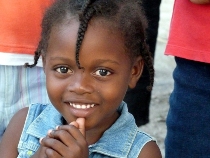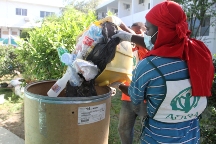Child survivors of the recent earthquake in Haiti continue to suffer from physical and psychological injuries caused by the ongoing crisis, making recovery for the nation’s youngest citizens even more difficult. In response, the Adventist Development and Relief Agency (ADRA) has opened a Children’s Center that is helping Haiti's children begin to heal.
Of the three million Haitians affected by the quake, more than one million are children, according to the United Nations Children’s Fund (UNICEF). Due to the severity of the traumatic events they have experienced, many of these children are currently suffering from Post-Traumatic Stress Disorder (PTSD), an illness that can cripple a person’s emotional and mental health, causing a wide range of problems, including depression, an inability to sleep, emotional numbing, violent behaviour, and delayed development.
"For these children who have lost so much, so quickly, they need a place where they can feel safe, and free to express the emotions they are experiencing, if they are to heal from the psychological damages that they have sustained," said Patricia Muller, Post-Traumatic Stress Program Coordinator for ADRA International.
To help these children, ADRA’s Post-Trauma Recovery Children’s Center, which is open five days a week, is targeting 4,000 children, or the entire population of children currently residing at the internally displaced persons camp (IDPs) located on the campus of the Adventist University of Haiti, in Carrefour. Nearly 100 volunteers are staffing the center, many of which are teachers from the local university and primary schools.
The center is divided into designated areas for the participating children, with no physical rooms due to the fear of closed spaces. One tent has been set aside for individual counselling and treatment. Participants are involved in rotating stations of various activities, including sports and recreational games, art therapy, and individual psychosocial counselling and treatment sessions, which are conducted by trained professionals.
These various activities help the children to relieve some of the stresses of their environment, and confront their experiences, which are activities essential to their long-term health. They also attend general education and health education classes, which will not only give them the skills they need to adjust to the new challenges brought on by the earthquake, but also help them to restore a sense of normalcy in their lives.
"Since the school system is not yet up and running, the children have had no organized activities," shared Muller. "This will help to fill the gap right now, occupying their hands and minds."
In addition, ADRA is working with unaccompanied children who are currently residing in the temporary camp, to determine whether they have been orphaned by the disaster or have simply become separated from their families.
Once their status is determined, ADRA will work with UNICEF, to determine what the next step will be for the children, explained Muller. "We want to make sure that this very vulnerable population of children receives the protection that they desperately need," she continued.
For more information about general relief work or to donate to the Adventist Development and Relief Agency International (ADRA), visit www.adra.org


